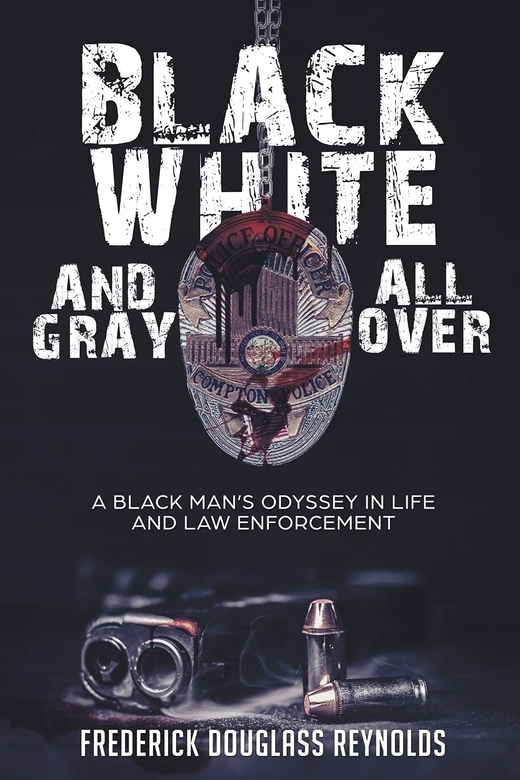A riveting and eye-opening read for every American, Black, White, and Gray All Over by Frederick Douglass Reynolds is a powerful story of family, struggle, redemption, and resilience as a black police officer on the mean streets of Compton.
Recounting his life in emotional detail in the opening chapters, the author’s roots are revealed, as are the early struggles that led him towards a career in law enforcement. The majority of the book then details his decades on the force, delving into the nitty-gritty history of Compton street gangs and power structures, as well as the near-constant war being waged between Compton PD and the city’s most volatile elements.
The timeliness of this book cannot be overstated; written largely over the past two years, but drawing on lived experience from the past fifty, Reynolds’ arguments and opinions are incredibly contemporary. Readers are given a ride-along peek at the endless complexity of criminal activity, societal failings, power limitations, and political machinations that made Compton one of America’s deadliest cities in the 70s, 80s, and 90s, but his insights and observations can apply to cities throughout the country.
While some anti-police or BLM supporters may immediately discount reading a book written by a police officer, this is not written by a blindly devoted cop without self-awareness or compassion for the other side. Reynolds has felt the sharp sting of institutional racism and cruelty in this country – as a rebellious youth and gang member in Detroit, during his service in the US military as a grunt stationed in Japan, and even as a Greyhound employee living out of his car in LA. His story makes for essential and enveloping reading, even before he enters the police force.
Eventually making his way into the Compton PD, as one of only five Black graduates in a class of ’85, the color of his skin continued to separate him. Throughout his years on the force, he admits to bearing witness to plenty of racist behavior, and struggled to eliminate his own long-standing biases: “I had always considered the White cops to be racist until they proved they weren’t.” This has certainly colored his opinion on law enforcement, and the recent backlash against police brutality in this country, but he also shares this story with a critical eye.
Reynolds is clear that he did find fraternity and friendship throughout his career as a police officer, aiding him through incredible amounts of emotional and physical trauma in the line of duty. As he comments in the introduction, there are good cops, and there are bad cops, but the majority fall somewhere in the gray that lies between, the nebulous space where violence is used to uphold peace, where collateral damage is inevitable, and where the ends don’t always justify the means. Though he lands firmly on the pro-police side, he also sees a need to re-imagine the relationship between police departments and the communities they serve, which is one of the core issues that makes this book such a vital read.
On a technical level, the book is remarkably well-edited and the prose is rich with visceral descriptions. Reynolds masterfully captures the gritty pain on Compton’s streets, the tension of an overworked police department, the grief of losing dear friends, and the real fear of losing his own way. However, there are some chapters that move slower than others, and the author occasionally gets bogged down in procedural details that may not be as relevant or interesting to the average reader.
Those small critiques aside, this brutally honest look at our troubled society will be hard to forget, wherever you fall on the political spectrum.
Book Links
STAR RATING
Design
Content
Editing
Get an Editorial Review | Get Amazon Sales & Reviews | Get Edited | Get Beta Readers | Enter the SPR Book Awards | Other Marketing Services
























Leave A Comment